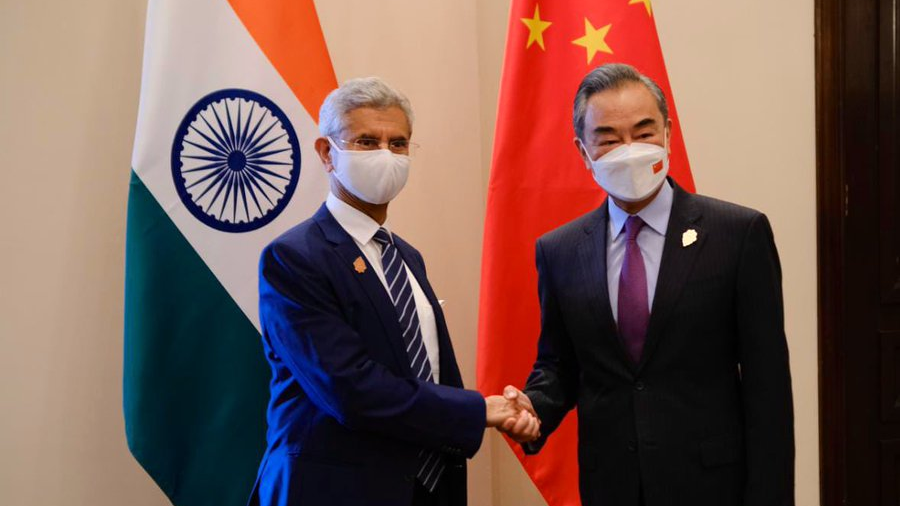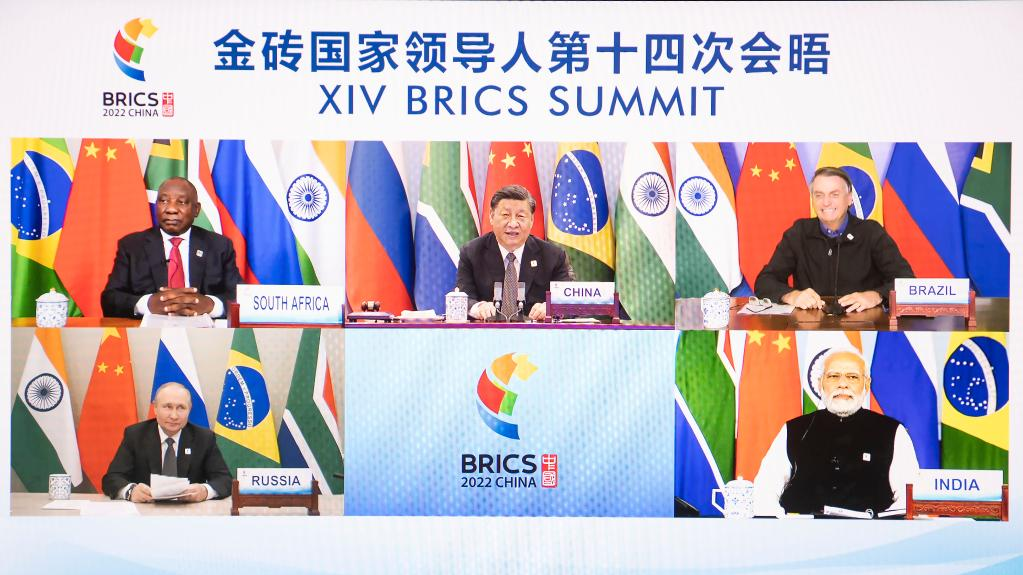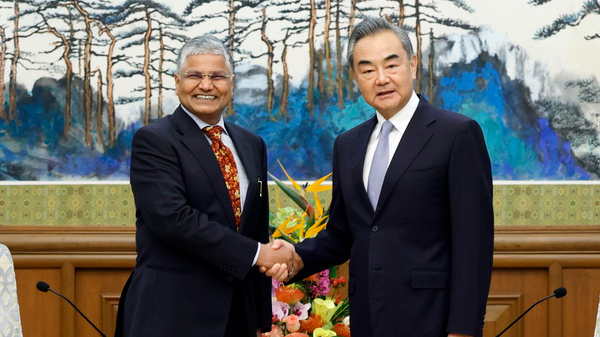
Chinese State Councilor and Foreign Minister Wang Yi (R) met with India's External Affairs Minister Subrahmanyam Jaishankar on the sidelines of the G20 Foreign Ministers' Meeting in Bali, Indonesia. /via Twitter @DrSJaishankar
Chinese State Councilor and Foreign Minister Wang Yi (R) met with India's External Affairs Minister Subrahmanyam Jaishankar on the sidelines of the G20 Foreign Ministers' Meeting in Bali, Indonesia. /via Twitter @DrSJaishankar
Editor's note: Abhishek G Bhaya is a senior journalist and international affairs commentator. The article reflects the author's opinions and not necessarily the views of CGTN.
Ties between China and India are showing signs of thawing after a two-year-long chill that shrouded the bilateral engagements following the fatal Galwan Valley military clashes along their perilous, frozen, and disputed Himalayan borders in the summer of 2020. In recent months, the two Asian powers have increasingly shown the willingness to take forward their relations in a positive direction as they see a common cause in their quest for a multipolar world order and shared interests in multilateralism, amid turbulent geopolitical developments.
Over the past two years, while both sides kept interacting through various multilateral organizations such as the BRICS, Shanghai Cooperation Organization (SCO), and G20, a bilateral diplomatic breakthrough came in late March when Chinese State Councilor and Foreign Minister Wang Yi made a surprise visit to New Delhi and held talks with India's External Affairs Minister Subrahmanyam Jaishankar and India's National Security Advisor Ajit Doval. This was the first bilateral meeting between the two sides in over two years.
Wang and Jaishankar met again on Thursday on the sidelines of the ongoing G20 Foreign Ministers' Meeting in Bali, Indonesia, where they exchanged views on bilateral, regional, and global issues. "Since March this year, China and India have maintained communication and exchanges, effectively managed differences, and bilateral relations have generally shown a recovery momentum," he said at the meeting.
Wang reiterated that "China and India are not each other's threats, but cooperation partners and each other's developmental opportunities," an important consensus that has been reached between the top leadership of the two countries. He made a vital call for bringing the bilateral relations back on the right track at an early date. "Let's light up the bright future of the relations together," he said.
Jaishankar, meanwhile, underscored that the bilateral relations between the two neighbors is best served by observing the three mutuals – mutual respect, mutual sensitivity, and mutual interests. The Indian minister called for an early resolution of all the outstanding issues while reiterating the need to sustain the momentum to complete disengagement and restore peace and tranquillity in the border areas, according to a readout of the meeting released by India's Ministry of External Affairs (MEA).
Earlier this month, China also lifted the COVID-19 pandemic-related visa and travel restrictions from India that were in place for a little over two years. The two sides are currently exploring the possibility of resuming direct flight services between the two countries, which remain suspended since the initial days of the COVID-19 outbreak.
Spirit of multilateralism

Chinese President Xi Jinping (C) hosts the 14th BRICS Summit via video link in Beijing, China, June 23, 2022. /Xinhua
Chinese President Xi Jinping (C) hosts the 14th BRICS Summit via video link in Beijing, China, June 23, 2022. /Xinhua
While bilateral ties remain important, it is also crucial that China and India, as the two of the largest economies and powers outside the Western world, continue to engage on regional and global issues in the spirit of multilateralism that both nations espouse, at a time of intense geopolitical flux.
The world recently witnessed how China and India took an identical position on the Russia-Ukraine crisis and refused to implement economic sanctions against Moscow despite overwhelming Western pressure. Their policy choices were in line with their shared vision of a multipolar world order, as opposed to the one that perpetuates the U.S., or Western, hegemony.
The Chinese foreign minister on Thursday noted that China and India share common interests and similar reasonable aspirations. As the world is undergoing profound changes unseen in a century, major countries like China and India will definitely not go with the flow, but are destined to uphold strategic determination, achieve their respective development and revitalization with established goals, and make greater contributions to the future of mankind, he said.
"Both China and India adhere to the general direction of multilateralism, and have similar views in the fields of safeguarding peace and security, boosting economic recovery, improving global governance, and jointly combating COVID-19," Wang said listing a few of the common interests between the two countries. There are also other factors such as improving the lives of their huge populations through sustainable development, food, and energy security, climate change, etc., where the two Asian giants face similar challenges.
As Wang reinforced, the two sides should strengthen coordination and cooperation, and make joint efforts to make international relations more democratic, international order fairer, and work towards making the developing countries' voices heard more and their legitimate interests protected better.
Diplomatic bonhomie

On June 22, 2022, State Councilor and Foreign Minister Wang Yi met with New Indian Ambassador to China Pradeep Kumar Rawat.
On June 22, 2022, State Councilor and Foreign Minister Wang Yi met with New Indian Ambassador to China Pradeep Kumar Rawat.
In another sign of diplomatic bonhomie, Jaishankar's statement at the GlobSec 2022 Bratislava Forum in early June where he criticized the Eurocentric mindset while asserting that Russia-Ukraine conflict will have no impact on China-India relations and that the two countries can manage their differences without any external help was widely lauded by Chinese analysts and media. So much so, that even Wang, during his meeting with the new Indian Ambassador to China Pradeep Kumar Rawat last month, praised Jaishankar's independent stance.
Noting that China-India relations are among the most important bilateral relations in the world, Rawat, in return, maintained that the common interests between the two countries far outweigh their differences. "The two great civilizations have learned from each other through history and fostered rich and beautiful cultural treasures," he said, adding that New Delhi is prepared to "realize the full potential" of its ties with Beijing.
Subsequently, Indian Prime Minister Narendra Modi joined other BRICS leaders to attend the BRICS Summit, held virtually last month, and presided over by Chinese President Xi Jinping. Wang, on Thursday, appreciated India's support during China's BRICS chairship this year and extended Beijing's support for India's G20 and SCO presidency next year.
Prior to the 2020 border clash, Xi and Modi had held 18 bilateral meeting, many of those on the sidelines of SCO, G20 and BRICS summits. Their last in person meeting was in October 2019, when Xi flew down to the southern India's ancient city of Mamallapuram to meet Modi for their second informal summit. In coming months, as the world gradually recovers from the COVID-19 pandemic and international travel normalizes, the two leaders are likely to meet more often. That could pave the way for the much-needed normalization of bilateral relations.
An improvement in China-India ties is not only important for Asia, it is paramount for global peace, security and human development. Recognition of common interests, commitment to multilateralism and jointly working to find solutions to global problems are only the first steps in that direction.
(If you want to contribute and have specific expertise, please contact us at opinions@cgtn.com. Follow @thouse_opinions on Twitter to discover the latest commentaries on CGTN Opinion section.)

